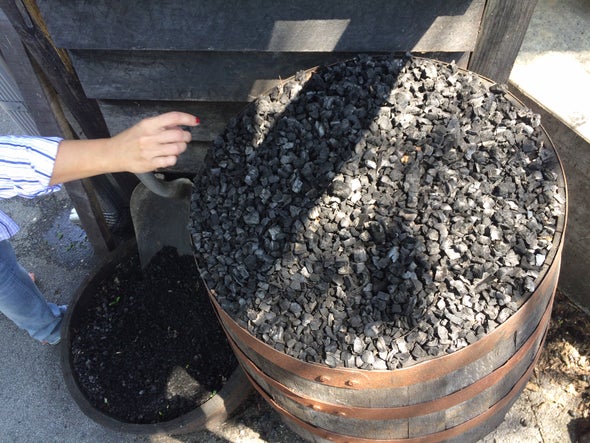(单词翻译:单击)
听力文本
This is Scientific American's 60-second Science, I'm Christopher Intagliata.
Bourbon whiskey doesn't have to be made in Bourbon County, Kentucky. But it does have to be produced from at least 51 percent corn and be aged in unused charred oak barrels.
Tennessee whiskey, on the other hand, must be made in Tennessee, as the name implies. And in addition to the steps that create a bourbon, the distilled whiskey undergoes another one called the Lincoln County Process, "where you take your fresh whiskey distillate and you filter it through sugar maple charcoal. It's also called charcoal mellowing."
Trent Kerley is a graduate student in food science at the University of Tennessee Institute of Agriculture. And just for the record: "Personally, I prefer bourbon whiskeys."

Filtration through charcoal made from the wood of the sugar maple tree is known to mellow the flavor of Tennessee whiskeys like Jack Daniels. But the underlying chemistry was a bit more of a mystery. So Kerley teamed up with the Sugarlands Distilling Company in Gatlinburg, Tennessee to put their whiskey to the test.
He used gas chromatography, coupled with human sniffing, to identify about three dozen aromatic compounds contributing to the whiskey's flavor profile. He then tracked the quantities of four of them — two branched alcohols and two ethyl esters — before and after the Lincoln County Process. Turns out the charcoal stripped out a third of the branched alcohols and nearly half of the ethyl esters. Kerley's advisor, food chemist John Peter Munafo:
"Take-home message is that branched alcohols and the ethyl esters that we analyzed in this study decreased, and the distillate was smoother tasting and less harsh after the Lincoln County Process." The researchers presented the work at an American Chemical Society meeting in Orlando.
The goal, Kerley says, is to take some of the guesswork out of making great whiskey — especially when the stakes are high. "There was a head distiller at one of the big bourbon distilleries who said, you really only get two chances to make a 15-year-old whiskey." Munafo again: "Basically we're just optimizing the tools to help the distillers get to the flavor profile they want."
As for the flavor profile he wants? "Well, I'm not saying Tennessee whiskey is better. It just is."
Thanks for listening for Scientific American — 60-Second Science. I'm Christopher Intagliata.
参考译文
这里是科学美国人——60秒科学系列,我是克里斯托弗·因塔格里塔。
波本威士忌不一定必须在肯塔基州波本郡酿造。但其酿造原料中必须包含51%的玉米,还要在未曾使用过的烘炙橡木桶中陈酿。
但是,田纳西威士忌,顾名思义,必须要在田纳西酿造。除了酿造波本威士忌所需的步骤外,蒸馏威士忌还要经过另一个步骤——林肯郡处理法,即“使用糖枫木炭过滤新鲜的威士忌蒸馏液。这一过程也称为木炭柔化。”
田纳西大学农业研究所的食品学研究生特伦特·克利说到。说实话:“我个人更喜欢波本威士忌。”
我们知道,用糖枫木制成的木炭过滤后,田纳西威士忌的口感会变得醇厚,比如杰克·丹尼威士忌。但其潜在的化学成分更像是一个谜。因此,克利与田纳西州加特林堡的舒格兰兹精馏公司合作,对该公司的威士忌进行测试。
他用气相色谱法结合人的嗅觉,识别了大约36种有助于形成威士忌风味的芳香化合物。之后,他追踪了其中四种物质——两种支链醇和两种乙酯——在林肯郡处理法使用前后的数量。结果发现,木炭滤掉了三分之一的支链醇和近一半的乙酯。克利的导师、食品化学家彼得·穆纳福表示:
“关键信息是,我们在这项研究中分析的支链醇和乙酯数量都下降了,经过林肯郡处理法后,馏出液的口感更顺滑,刺激性也有所减少。”研究人员在奥兰多举行的美国化学学会会议上展示了这项研究成果。
克利表示,他们的目标是减少酿造优质威士忌过程中的不确定性——尤其是风险很高的时候。“一家大型波本威士忌酒厂的首席酿酒师说,你真的只有两次酿造出15年威士忌的机会。”穆纳福再次表示:“基本上,我们只是在优化工具,帮助酿酒师得到他们想要的口味。”
那穆纳福想要什么口味呢?“嗯,我不是说田纳西威士忌更好。而是它本来就好。”
谢谢大家收听科学美国人——60秒科学。我是克里斯托弗·因塔利亚塔。
译文为可可英语翻译,未经授权请勿转载!
重点讲解
重点讲解:
1. in addition to 另外;加之;除…之外;
In addition to my weekly wage, I got a lot of tips.
除了每周的薪水外,我还能得到不少小费。
2. team up with (与…)组队;(与…)协作;
Elton teamed up with Eric Clapton to wow thousands at a Wembley rock concert.
埃尔顿和埃里克·克拉普顿在温布利举行的一场摇滚音乐会上联袂演出,征服了数千位听众。
3. put sth. to the test 使经受检验;对…进行试验;
The Liverpool team are now putting their theory to the test.
利物浦队此时正在验证他们的理论。
4. couple with 把…与…连接起来;
Overproduction, coupled with falling sales, has led to huge losses for the company.
生产过剩加上销售下降使这家公司遭受巨大损失。


